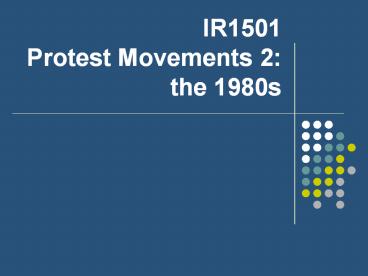IR1501 Protest Movements 2: the 1980s - PowerPoint PPT Presentation
1 / 11
Title:
IR1501 Protest Movements 2: the 1980s
Description:
The next big wave of protest with international significance: 1980s Europe ... Can peace be won by threatening millions of civilians? ... – PowerPoint PPT presentation
Number of Views:68
Avg rating:3.0/5.0
Title: IR1501 Protest Movements 2: the 1980s
1
IR1501 Protest Movements 2 the 1980s
2
Protest in the 1980s
- The next big wave of protest with international
significance 1980s Europe - protests against the nuclear arms race - the
Greenham Common - Environmental politics
- Social protest against communism in Eastern
Europe Poland
3
Anti-Nuclear Protests
- Importance of CND Campaign for Nuclear
Disarmament - Mirrors the development of deterrence and the
Cold War historically - Most prominent as aspect of anti-war protest in
Europe in the 1980s - inspired by anti-Vietnam War movements
- But not questioning a Hot War challenges
deterrence as a balance of terror - Can peace be won by threatening millions of
civilians? - Levels of armaments are obscene and futile arms
control deals of the 1970s have given way to
Reagans renewed antagonism and spending - Unimpressive to a generation of Europeans at the
frontline of superpower rivalry
4
The Greenham Common
- March against nuclear silos of Greenham Common
USAF base - Critique of British support of US putting an
instrument of nuclear warfare abroad - alliance
is suicide? - Critique of logic of Cold War is echoed in places
like Germany the front line of potential nuclear
warfare - Turns into a womens-only Peace Camp
- Permanent, non-violent, creative protest
throughout the 1980s - Vehicle for empowerment, protest and solidarity
- Harassed by police...
- Protests marches, hugging the camp, jumping
the fence to dance on the silos
5
Greenham Common Peace Camp
6
The Bases for Ecopolitics
- Lack of sense of responsibility of common
resources air, oceans - importance of interdependence among humans
- Each states behaviour affects the whole system
- E.g deforestation of the Amazon forest
- questions myths of benefits of technological
progress - Economic/development gains vs. sustainability
- symbiosis with other living systems
- Pollution, greenhouse effect, global warning
- putting environmental questions as core of
politics (nationally and globally) - E.g. Influential on genetic modification
- proposing alternatives energy policy, eco-living
7
Types of Ecopolitics
- non-violent protest groups
- violent/terrorist groups
- Political parties e.g. Germany
- State policies
- most created in 1960s and 1970s, but popularity
increasing in 1980s - Institutionalised into the political agenda
nationally and internationally in the 1990s (e.g.
Kyoto Protocols) - popularity linked to anti-nuclear movements
8
Greenpeace
- Read at greenpeace.org
- Main attributes
- Individually-sponsored NGO - political
independence from states and multi-national
corporations - actions campaigning and direct action to stop
abuses and promote alternatives - E.g. whaling, seals, nuclear testing, pollution,
climate change - methods non-violent, high-profile
- geographical focus global
- Seen as politically dangerous French secret
service planted a bomb on the Rainbow Warrior to
stop nuclear test protest
9
The Rainbow Warrior Whaling Campaign Campaign
against nuclear waste dumping at Sellafield
10
Impact
- More systematically international in orientation
than the 1960s wave - These issues stem from international problems
instead of simply having international
implications - Closer focus on institutionalising new values
into the process of politics - 1960s protests often focused on being
anti-establishment - 1980s are about infiltrating the establishment
ecopolitics or connecting dimensions of protest
gender peace. - Effectiveness?
- Agenda is now on nuclear proliferation, not
disarmament - Environmental issues are very high profile, but
destruction has accelerated despite some
successes e.g. whaling, industrial pollution
11
Today
- The most high profile movements are animal rights
campaigns often nationally focused, and the
anti-globalisation movement - Climate change has become mainstreamed as a core
issue, but only very recently - The importance of direct participation for the
next generation? - What does it mean for a social movement to be
successful? - Evidence shows that direct political changes are
gradual and partial - But what are the right criteria of assessment
e.g. the end of nuclear weapons, or the nurturing
of a culture of peace? - Most of all it protest changes the participants
success in the creation of news ways to think and
to live, bringing freedom and empowerment to
participants































